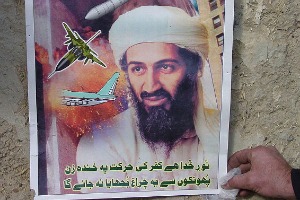Read Karen Greenberg’s previous coverage of the trial of Ahmed Khalfan Ghailani, the first Guantanamo detainee to be tried in a civilian court.
Even before the trial of Ahmed Ghailani started, the role of the Tanzanian National Police has haunted the proceedings in an unsettling way. On Wednesday, these suspicions received some added weight when Ghailani’s cousin, Ladha Hussein, took the stand. Ten years older than Ghailani, Hussein sat 20 feet away from the cousin he hadn’t seen since 1998. As Hussein talked through a Swahili translator, Ghailani, dressed in a white button-down and tie, watched with open-eyed interest and unflagging attention.
For a while, all seemed normal. The prosecutor attempted to shed doubt on Ghailani’s alleged terrorist connections by asking about the time that Ghailani, who visited Hussein and his cousin’s parents several times a week, brought a friend from Mombasa. Similarly, the prosecution asked about Ghailani’s announcement in 1998, a month or so before the embassy bombings in Tanzania and Kenya, that he was going to “look for livelihood” in Yemen. At first, defense counsel Peter Quijano’s cross examination also took the expected road, eliciting the fact that Ghailani wore what he called “Western” garb, jeans and a T-shirt—evidence that he had not become intensely religious.
Then, as the end of the day approached, Quijano shifted into less comfortable territory. He began by asking about how much the government has given Hussein’s for his trip to the United States. Hussein, emptying out his pockets to see how much he’d been given, began to mention numbers: $100 in Tanzania, then $50 once he got here, then $145, then $436. (Hussein said he made about $200 a month back in Tanzania.) Are you expecting more, Quijano asked him, “Not that I know of,” Hussein answered.
On redirect, the prosecution pointed out that the money was, among other things, for food. Based on this and other testimony, it is apparent that some of the Tanzanian witnesses have received $110 from the US government as well as receiving some funds back home to leave with their families. (Hussein has five children.)
Quijano’s mention of the money was only an appetizer for his real point. What he was trying to highlight was not the behavior of American officials, but the influence of the Tanzanian National Police. Hussein testified that when he arrived in the United States last Thursday morning, his TNP escorts had kept him from meeting with the defense team. Hussein said that the police have been keeping a close watch on him in New York, including staying on the same floor of his hotel. Hussein recalled that when he called the defense team’s translator, a TNP officer shouted that he wasn’t authorized to do this. The officer took Hussein’s phone, and it wasn’t until Tuesday evening, the night before his testimony, that he finally met with the defense team. The prosecutors apparently arranged the meeting.
Quijano’s suggestion of foul play raises questions about the role of the Tanzanian National Police, an organization that has been a haunting presence throughout this trial. On at least two occasions the judge has interrupted questioning to ask a Tanzanian witness on the stand: Did the FBI talk to you in Swahili? Do you understand English? Well, then, how did you understand the questions being asked you by the FBI? Who translated for you? The answer has been the Tanzanian police. It has been made apparent on several occasions that the TNP has detained, or in the words of one witness, “remanded” individuals in connection with this trial, even if they have not been formally arrested. In nearly every cross examination of a Tanzanian witness, the defense counsel has suggested that the original testimony given in the presence of Tanzanian police acting as translators, differed from that later given to the FBI, the US Attorney’s office, or here in federal court.
The defense also has hinted that they may think that the TNP was present at certain locations related to the embassy bombing prior to the arrival of the FBI’s investigators, a theme that may play out when the defense presents its in case in the coming weeks. (In contrast, there has been virtually no comparable suggestion of distrust or foul play in regards to the Kenyan police.)
Although no one in the media or even in the courtroom seems particularly disturbed by the sense that testimony may have been altered and that the Tanzanian National Police may hold some if not all of these witnesses in the grip of fear, it could have some searing implications for this case. If Ghailani is convicted, it will have to be because the jury does not believe that fear influenced the witnesses’ testimony, and that the case against Ghailani has the ring of truth to it.
Research for this post was contributed by Center on Law and Security researcher Samantha Schott.










